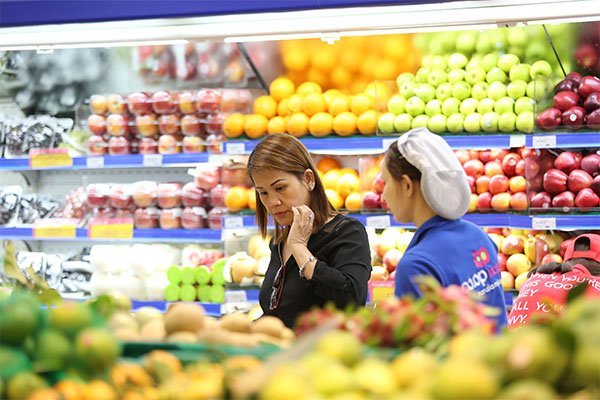|
Vietnam is
world’s fourth most optimistic country in Q1
With nine points higher than in the last
quarter of 2017 on the back of increased positivity about local job prospects
and the state of personal finances, the Vietnam consumer confidence index in
the first quarter of 2018 was at its highest in a decade, which made the
Southeast Asian nation the fourth most optimistic country in the world.

A shopper (L) inspects
fruit at a Co.opmart supermarket in HCMC. Vietnam is the world’s fourth most
optimistic country in the first quarter of this year
Consumers in Southeast Asia remained relatively
optimistic in January-March, with confidence increasing by two points from
119 in the fourth quarter of 2017 to 121 in the first quarter of this year,
according to the latest issue of The Conference Board Global Consumer
Confidence Survey, in collaboration with Nielsen, a global information and
measurement company.
The first-four survey shows that three out of six
countries with the highest confidence scores were Vietnam, the Philippines
and Indonesia. Notably, the Vietnam consumer confidence index gained an
all-time high of 124 points.
Emerging countries like Vietnam, Philippines and
Malaysia registered annual average gross domestic product (GDP) growth of 5%
to 7% in the final quarter of last year.
Therefore, the good momentum of economic growth,
coupled with the positive signals of foreign investment flows, increasing
household income and growth-oriented government policies, could translate
into consumer optimism, said Nguyen Huong Quynh, managing director of Nielsen
Vietnam.
“However, positive sentiment in Vietnam did not lead to
strong fast-moving consumer goods (FMCG) sales, with the market up just 1.8%
in quarter one. The growth was slower than expected and reflected the
volatility of the FMCG industry, possibly due to changing consumer
behaviors,” she said.
Spending and saving at the same time
Having covered essential living expenses, Vietnamese
consumers were eager to spend on big-ticket items to enhance the quality of
life. This desire had slowly grown in the last four quarters, according to
the report.
In particular, nearly half of consumers were willing to
spend their spare cash buying new clothes (51%) and traveling (46%). Besides,
around two in five spent on new technology products (46%), out of home
entertainment (43%) and home improvements (42%).
More importantly, spending on health insurance premiums
surged a significant nine points at 38% in this quarter.
However, Vietnamese consumers still had a strong
affinity for saving. Close to three-fourths (73%) would put their spare cash
into savings (compared to 72% in the previous quarter).
The report also revealed that saving was an integral
part of Southeast Asian consumers, with 67% of respondents putting their
spare cash into savings.
“While health insurance was once thought of as luxury
years ago, Vietnamese consumers now start getting financial assistance to pay
for health insurance programs,” said Quynh of Nielsen Vietnam.
She added this trend reflected one of the changes in
consumers’ mindsets. When consumers cover themselves with insurance plans,
they could have a sense of protection.
Having stable jobs and good health remain top concerns
In the first quarter, the top five concerns of
Vietnamese consumers remained the same as in the previous quarter.
Job security continued to top the list of Vietnamese
consumers’ key concerns (43%). The next key concern was health (41%),
followed by work and life balance (23%), the economy (23%), and the parents’
welfare and happiness (16%).
“In today’s world of information and technology,
consumers are better informed as they can easily search for news and information.
They can foresee some short-term challenges such as the current condition of
the economy, job security, health and work-life balance,” said Quynh.
She noted that these concerns may result in curbing
their discretionary spending this year.
SGT
|
Thứ Ba, 3 tháng 7, 2018
Đăng ký:
Đăng Nhận xét (Atom)
Không có nhận xét nào:
Đăng nhận xét